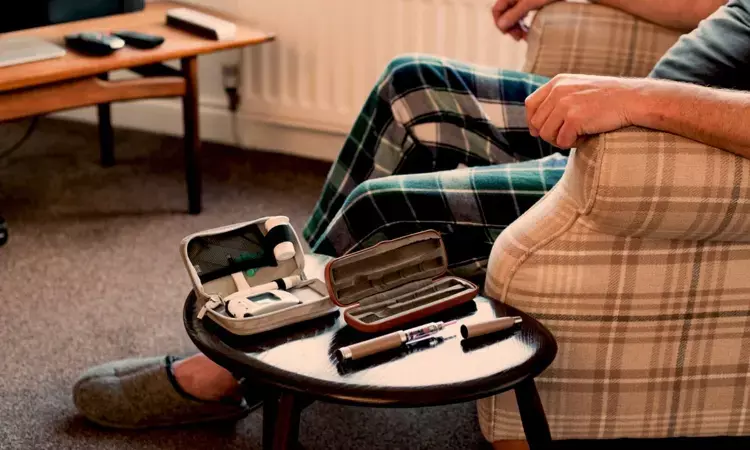- Home
- Medical news & Guidelines
- Anesthesiology
- Cardiology and CTVS
- Critical Care
- Dentistry
- Dermatology
- Diabetes and Endocrinology
- ENT
- Gastroenterology
- Medicine
- Nephrology
- Neurology
- Obstretics-Gynaecology
- Oncology
- Ophthalmology
- Orthopaedics
- Pediatrics-Neonatology
- Psychiatry
- Pulmonology
- Radiology
- Surgery
- Urology
- Laboratory Medicine
- Diet
- Nursing
- Paramedical
- Physiotherapy
- Health news
- Fact Check
- Bone Health Fact Check
- Brain Health Fact Check
- Cancer Related Fact Check
- Child Care Fact Check
- Dental and oral health fact check
- Diabetes and metabolic health fact check
- Diet and Nutrition Fact Check
- Eye and ENT Care Fact Check
- Fitness fact check
- Gut health fact check
- Heart health fact check
- Kidney health fact check
- Medical education fact check
- Men's health fact check
- Respiratory fact check
- Skin and hair care fact check
- Vaccine and Immunization fact check
- Women's health fact check
- AYUSH
- State News
- Andaman and Nicobar Islands
- Andhra Pradesh
- Arunachal Pradesh
- Assam
- Bihar
- Chandigarh
- Chattisgarh
- Dadra and Nagar Haveli
- Daman and Diu
- Delhi
- Goa
- Gujarat
- Haryana
- Himachal Pradesh
- Jammu & Kashmir
- Jharkhand
- Karnataka
- Kerala
- Ladakh
- Lakshadweep
- Madhya Pradesh
- Maharashtra
- Manipur
- Meghalaya
- Mizoram
- Nagaland
- Odisha
- Puducherry
- Punjab
- Rajasthan
- Sikkim
- Tamil Nadu
- Telangana
- Tripura
- Uttar Pradesh
- Uttrakhand
- West Bengal
- Medical Education
- Industry
Rare case of Severe Hypoglycemia in diabetes patient Following Anesthesia Induction: A report

Acute severe hypoglycemia immediately following anesthesia induction is a rare but life-threatening complication that is frequently underdiagnosed due to insufficient awareness
A recent case analysis found acute severe hypoglycemia immediately following anesthesia induction in the perioperative setting. The key observations by Qin Tian and team were published in the Journal of Medicine.
The case report found that after examining the case of an 89 year old man with type 2 diabetes mellitus, he experienced a dramatic drop in blood glucose levels from a baseline of 4.0 mmol/L to a perilous 0.96 mmol/L immediately after the induction of anesthesia. More importantly, the patient displayed normal insulin, C-peptide, and cortisol levels, thereby eliminating other potential causes that lead to hypoglycemia. The temporal association and rapid decline implicated opioids as the likely impact.
After the diagnosis, the patient received a prompt intervention of 40 ml of 50% dextrose intravenously which was followed by a 5% dextrose infusion. Fortunately, recovery from anesthesia was uneventful with no further hypoglycemic episodes during the period of hospitalization.
This case report highlights the often-neglected connection between opioids and severe hypoglycemia during anesthesia. Thereby, the outcomes observed emphasize the necessity for vigilant glucose monitoring in the perioperative period. The implications of this research extend beyond just this one case which points to a broader need for awareness among clinical anesthesiologists. This case report altogether reassures that timely diagnosis can be pivotal in averting life-threatening hypoglycemic events with safer outcomes in the field of anesthesia. Prompted by the life-threatening complications of this rare but underdiagnosed occurrence, this case report underscores the critical need for increased awareness and vigilant glucose monitoring during procedures involving anesthesia.
Source:
Tian, Q., Yi, M. L., Wan, J. L., & Yin, H. (2023). Acute severe hypoglycemia immediately after induction of anesthesia in an elderly patient with type 2 diabetes mellitus: A case report. In Medicine (Vol. 102, Issue 51, p. e36683). Ovid Technologies (Wolters Kluwer Health). https://doi.org/10.1097/md.0000000000036683
Neuroscience Masters graduate
Jacinthlyn Sylvia, a Neuroscience Master's graduate from Chennai has worked extensively in deciphering the neurobiology of cognition and motor control in aging. She also has spread-out exposure to Neurosurgery from her Bachelor’s. She is currently involved in active Neuro-Oncology research. She is an upcoming neuroscientist with a fiery passion for writing. Her news cover at Medical Dialogues feature recent discoveries and updates from the healthcare and biomedical research fields. She can be reached at editorial@medicaldialogues.in
Dr Kamal Kant Kohli-MBBS, DTCD- a chest specialist with more than 30 years of practice and a flair for writing clinical articles, Dr Kamal Kant Kohli joined Medical Dialogues as a Chief Editor of Medical News. Besides writing articles, as an editor, he proofreads and verifies all the medical content published on Medical Dialogues including those coming from journals, studies,medical conferences,guidelines etc. Email: drkohli@medicaldialogues.in. Contact no. 011-43720751


